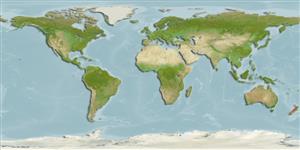Classification / Names
Common names | Synonyms | Catalog of Fishes(genus, species) | ITIS | CoL | WoRMS | Cloffa
Teleostei (teleosts) >
Pleuronectiformes (Flatfishes) >
Rhombosoleidae (South Pacific flounders)
Etymology: Peltorhamphus: Greek, pelteos, peltes = a fish named as "korakinos"; when it was salted received the name of "pelte" + Greek, rhamphos = bill (Ref. 45335).
Environment: milieu / climate zone / depth range / distribution range
Ecology
Marine; demersal; depth range 5 - 47 m (Ref. 123823), usually 9 - 38 m (Ref. 123823). Subtropical
Southwest Pacific: New Zealand.
Size / Weight / Age
Maturity: Lm ? range ? - ? cm
Max length : 15.7 cm SL male/unsexed; (Ref. 123823); 16.1 cm SL (female)
Short description
Identification keys | Morphology | Morphometrics
Dorsal soft rays (total): 98 - 116; Anal soft rays: 62 - 72. This species is distinguished from its congeners by the following set of characters: elongated body with greatest depth more evenly distributed over its length and with more gradual posterior taper beyond this point; long, filamentous second ocular-side pectoral-fin ray is longer than, or equal to its greatest body depth; head relatively narrow; scales on blind sides of dorsal- and anal-fin rays (at sizes ? 70 mm SL); with higher and mostly non-overlapping meristic values, total vertebrae ? 40, D 98-116, A 62-72, lateral-line pores 82-106,supracranial pterygiophores 25-31, usually 10–15 ; gill rakers on first gill arch usually 10-5; scales between mid-eye and dorsal margin of head usually 8-10; scales between anteroventral margin of lower (non-migrated) eye and dorsal margin of rostral hood above mouth usually 4-6; relatively small, thin gill rakers on upper limb of first gill arch. not reaching dorsalmost gill rakers on lower limb; with 1-5 fleshy, finger-like filaments on inner anteroventral margin of fleshy skinfold on ocular-side lower jaw; IO space relatively wide; and morphometric features including shorter postorbital length, narrower upper and lower head lobes, narrower caudal peduncle, smaller ratio of HW/HL, longer snout, and smaller eye. Colouration: ocular side with several faint longitudinal lines and sometimes with up to three dark blotches along lateral line; dorsal- and anal-fin rays and roof of mouth are uniformly pigmented; inner lining of ocular-side opercle dusky (not black) (Ref. 123823).
Found in subtidal coastal waters on sandy or sandy-mud bottoms. Small juveniles are caught at depths similar to those of adults, but juveniles are known to inhabit shallow water, not shallow-water inlets, perhaps reflecting an avoidance for areas with soft, silty substrates. Prey consumed may be similar to is congeners based on jaw morphology and mouth size, thus feeding on small small epibenthic and infaunal invertebrates such as crustaceans, molluscs, and polychaetes (Ref. 123823).
Life cycle and mating behavior
Maturity | Reproduction | Spawning | Eggs | Fecundity | Larvae
Munroe, T.A., 2021. Systematic revision of the flatfish genus Peltorhamphus Günther, 1862 (Teleostei: Pleuronectiformes: Rhombosoleidae), including description of a new species from Southeastern New Zealand, with biological and ecological summaries for the species. Zootaxa 4905(1):1-104. (Ref. 123823)
IUCN Red List Status (Ref. 130435: Version 2024-1)
Threat to humans
Harmless
Human uses
Tools
Special reports
Download XML
Internet sources
Estimates based on models
Preferred temperature (Ref.
123201): 10.6 - 18.2, mean 14.9 °C (based on 146 cells).
Phylogenetic diversity index (Ref.
82804): PD
50 = 0.6250 [Uniqueness, from 0.5 = low to 2.0 = high].
Bayesian length-weight: a=0.01820 (0.00790 - 0.04194), b=2.97 (2.76 - 3.18), in cm total length, based on LWR estimates for this (Sub)family-body shape (Ref.
93245).
Trophic level (Ref.
69278): 3.1 ±0.2 se; based on size and trophs of closest relatives
Resilience (Ref.
120179): High, minimum population doubling time less than 15 months (Preliminary K or Fecundity.).
Fishing Vulnerability (Ref.
59153): Low vulnerability (10 of 100).
